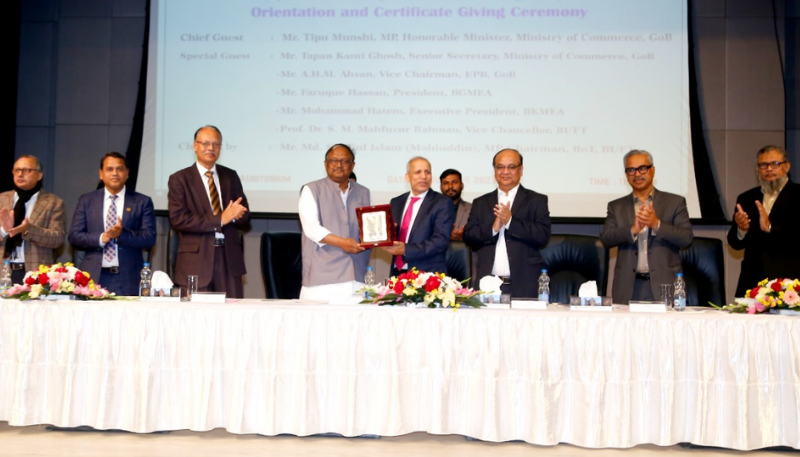
Commerce Minister Tipu Munshi on Thursday said that there is enough manpower at the mid-level in the ready-made garment (RMG) sector of the country and thus foreign manpower at the level in the sector is not required anymore.
"Necessary skilled managers have been created in the country at the mid-level in the RMG sector while they are also doing fine in their work. Although we have been performing such tasks through foreign manpower for long, now enough manpower has been created in the country. So, there is no need to bank on foreign managers anymore," he said.
The commerce minister said this while addressing as the chief guest at the orientation and certificate award ceremony of the BUFT-EPB PGD Programme for Mid-Level Management to create skilled managers in the RMG sector organised by the BGMEA University of Fashion and Technology (BUFT) in association with the Ministry of Commerce held in Turag, Dhaka.
The Export Promotion Bureau (EPB) in collaboration with BUFT has launched diploma courses for mid-level managers and employees of garment factories to develop their professional skills.
Tipu said the BUFT has been working to create skilled manpower in this sector.
Mentioning that skilled manpower is the main driving force for the industry, he said the aim of the government is to minimise dependency on foreign manpower in the RMG sector.

He said the home-grown manpower would meet the local demand as well as they would also have to play an important role in the industries.
The minister cited that the RMG sector of Bangladesh has been able to make its position in the second slot of the global RMG industry despite braving various adversities.
Currently around 82 per cent of the country's export receipts come from the RMG sector, he added.
Bangladesh Garment Manufacturers and Exporters Association (BGMEA) President Faruque Hassan said skill development including reskilling and upskilling were imperative to sustain the industry's competitiveness in the era of the fourth industrial revolution (4IR).
"Rapid advances in technologies led to a rise in demand for the workers and professionals who were skilled enough to operate advanced machinery and conduct complex and sophisticated production processes," he said.
While automation in the industry will pose new challenges, Faruque said it will also increase productivity and competitiveness. "We need to reap the benefits of industry 4.0 through skill development."
He said, "As we are preparing for the next growth phase, we have to enhance our business capabilities using the latest technologies that make production more efficient and faster."
The BGMEA president said though there was a perception that automation would result in the loss of many jobs, new jobs would emerge through the adoption of technologies.
"What we need is market-oriented skill training to turn challenges into opportunities," he added.
BUFT Board of Trustees Chairman Md Shafiul Islam Mohiuddin, BUFT Vice-Chancellor Prof SM Mahfuzur Rahman, Pro-VC Prof Ayub Nabi Khan, EPB Vice-Chairman AHM Ahsan, and Additional Secretary at the commerce ministry Abdur Rahim were present at the programme.
Mohammed Nasir, former vice-president (finance) of BGMEA and member of BUFT Board of Trustees, Md Moshiul Azam Shajal, former vice-president of BGMEA and member of BUFT Board of Trustees, and Abdullah Hil Rakib, director of BGMEA, among others, were also present at the certificate giving ceremony.